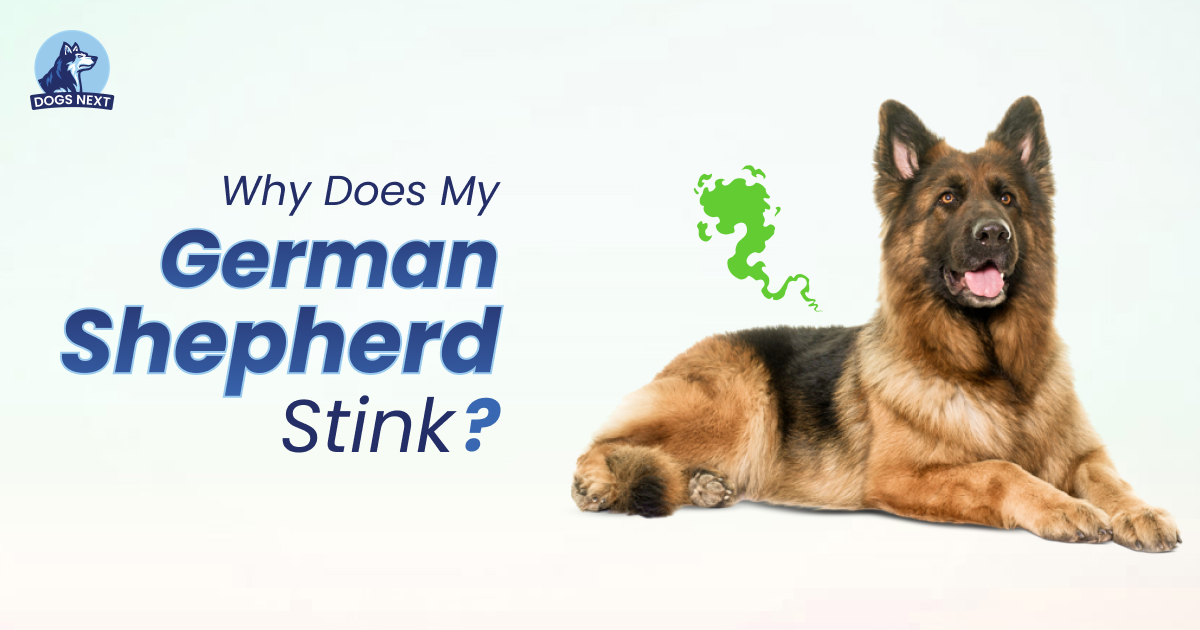German Shepherds can stink due to poor hygiene is a common cause, but skin issues, diet, and underlying medical conditions could also be the culprit. If you notice a persistent odor, it’s important to investigate further to identify the root cause and address it promptly.
Regular bathing and grooming, proper nutrition, and regular veterinary check-ups can help keep your German Shepherd healthy and smelling fresh. If you’d like to learn more about preventing odor in dogs or how to properly care for your German Shepherd, please read the full article.
Table of Contents
Why Your German Shepherd Stink: A Comprehensive Guide
German Shepherds are known to have a distinct, pungent smell that can be noticeable to their owners and others. German Shepherds are not generally stinky dogs, but some breeds stink more than others. In addition to having a lot of wrinkles, oily skin, and excessive drooling, hounds may also have the smell of body odor.
Good grooming and brushing generally will prevent your German shepherd from smelling bad and maintain good health. This is especially important if you haven’t given them a bath in a while or if he has gotten wet, or is rolling in something stinky.
The following are some of the most common causes of dog odor that can be attributed to the German Shepherd breed:
- Poor grooming or needing a hygiene trim
- Ear infection
- Dental issues
- Skin infection
- Foul breath
- Excessive licking due to allergies or anxiety
- Anal glands
- Bacterial infection
- Gas attacks
- Yeast infection
- Urinary tract infection
- Dermatitis
- Lack of grooming
- Hormone imbalance
- Wet dog
- Dirty environment
- Illness
- Diabetes
- Poor diet
Poor grooming or needing a hygiene trim
Poor grooming or needing a hygiene trim is a common reason for a bad odor in German Shepherds. If not properly groomed and brushed, their fur can trap dirt, oils, and bacteria, leading to an unpleasant smell.
Overgrown nails or matted fur can also contribute to the odor. Regular brushing, bathing, and hygiene trims can help prevent this issue. If you notice a persistent smell despite proper grooming, it’s important to investigate further to rule out any underlying medical issues.
Ear infection
An ear infection can also be a cause of bad odor in German Shepherds. Ear infections are often caused by bacteria or yeast overgrowth, and can produce a strong, unpleasant smell. Other symptoms may include itching, redness, and discharge.
If you suspect your German Shepherd has an ear infection, it’s important to consult with a veterinarian. Treatment typically involves cleaning the ears and using medication to clear up the infection, which can help alleviate the odor.
Dental disease
Dental disease is another common reason for a bad odor in German Shepherds. If left untreated, bacteria can build up on their teeth and gums, leading to inflammation and infection. This can cause a foul smell in their mouth, known as halitosis.
Regular dental care, such as brushing their teeth and providing dental chews, can help prevent dental disease. If you notice persistent bad breath, it’s important to have your German Shepherd’s teeth and gums examined by a veterinarian to ensure proper dental health.
Skin infection
Skin infection is a common cause of bad odor in German Shepherds. It can be caused by a variety of factors, such as allergies, flea infestations, or bacterial and fungal infections. Inflamed skin can produce an unpleasant smell due to the buildup of oils and bacteria.
Treatment for skin inflammation often involves identifying and addressing the underlying cause, such as antihistamines or antibiotics. Regular grooming, flea prevention, and a healthy diet can also help prevent skin inflammation and reduce odor.
If you suspect your German Shepherd has skin inflammation, it’s important to consult with a veterinarian.
Foul breath
Bad breath, or halitosis, can be another reason for a bad odor in German Shepherds. It can be caused by a variety of factors, including dental disease, gastrointestinal issues, or even an underlying medical condition.
Regular dental care, such as brushing your dog’s teeth and providing dental chews, can help prevent bad breath due to dental disease. If the bad breath persists despite proper dental care, it’s important to have your German Shepherd examined by a veterinarian to rule out any underlying medical issues.
Excessive licking due to allergies or anxiety
Excessive licking due to allergies or anxiety can also be a cause of bad odor in German Shepherds. When dogs lick excessively, it can lead to irritated and inflamed skin, which can produce an unpleasant smell. Identifying and addressing the underlying cause of excessive lickings, such as allergies or anxiety, can help reduce the odor.
Treatment may involve medications or behavioral modifications to address the underlying issue, as well as topical treatments to soothe and heal the skin. It’s important to consult with a veterinarian for proper diagnosis and treatment.
Anal glands
Anal glands can be another source of bad odor in German Shepherds. These glands are located on either side of the anus and secrete a strong-smelling fluid. If the glands become impacted or infected, it can produce a foul odor. Signs of anal gland issues may include scooting or excessive licking of the anus.
Treatment typically involves expressing the glands or prescribing antibiotics if the infection is present. If your German Shepherd is experiencing anal gland issues, it’s important to consult with a veterinarian for proper diagnosis and treatment.
Bacterial infection
Bacterial infections can also cause a bad odor in German Shepherds. These infections can occur on the skin, in the ears, or in other areas of the body. The bacteria can produce a strong, unpleasant smell, as well as other symptoms such as redness, itching, and discharge. Treatment for bacterial infections may involve antibiotics, topical treatments, or other medications.
It’s important to consult with a veterinarian for proper diagnosis and treatment, as untreated bacterial infections can lead to more serious health issues in your German Shepherd.
Gas attacks
Gas attacks, or flatulence, can also contribute to a bad odor in German Shepherds. This can be caused by a variety of factors, such as diet, gastrointestinal issues, or even swallowing air while eating or drinking.
To reduce gas attacks, it’s important to ensure your German Shepherd’s diet is high-quality and free from potential irritants. Feeding smaller meals throughout the day instead of one large meal can also help reduce gas.
If you’re concerned about your German Shepherd’s flatulence, it’s important to consult with a veterinarian to rule out any underlying medical issues.
Yeast infection
Yeast infections are another common cause of bad odor in German Shepherds. These infections can occur in the ears, skin folds, or other moist areas of the body. Yeast produces a musty or sweet odor, which can be quite strong. Symptoms may also include itching, redness, and discharge.
Treatment for yeast infections may involve topical or oral medications, as well as addressing any underlying factors that may be contributing to the infection. It’s important to consult with a veterinarian for proper diagnosis and treatment of yeast infections in your German Shepherd.
Urinary tract infection
Urinary tract infections (UTIs) can also cause a bad odor in German Shepherds. These infections can occur in the bladder, urethra, or other parts of the urinary tract, and can produce strong, foul-smelling urine. Other symptoms may include frequent urination, straining to urinate, and blood in the urine.
Treatment for UTIs typically involves antibiotics and increased water intake to help flush out the bacteria. If you suspect your German Shepherd has a UTI, it’s important to consult with a veterinarian for proper diagnosis and treatment.
Dermatitis
Dermatitis, or inflammation of the skin, can also contribute to a bad odor in German Shepherds. This can be caused by a variety of factors, such as allergies, parasites, or bacterial or fungal infections. Symptoms may include redness, itching, hair loss, and a strong odor.
Treatment for dermatitis may involve medications, such as antibiotics or antifungals, as well as addressing any underlying factors that may be contributing to the inflammation. It’s important to consult with a veterinarian for proper diagnosis and treatment of dermatitis in your German Shepherd.
Lack of grooming
A lack of grooming can also lead to a bad odor in German Shepherds. If your dog is not regularly groomed, excess dirt, oils, and dead skin cells can build up on their coat, leading to a strong, unpleasant smell.
Additionally, if their nails are not regularly trimmed, they can collect dirt and bacteria, which can also contribute to a bad odor. Regular grooming, including bathing, brushing, and nail trimming, can help keep your German Shepherd smelling fresh and clean.
Hormone imbalance
Hormone imbalances can also contribute to a bad odor in German Shepherds. Certain hormonal conditions, such as hypothyroidism or Cushing’s disease, can cause changes in the skin and coat that can lead to a strong odor. Other symptoms may include hair loss, weight gain, and lethargy.
Treatment for hormonal imbalances typically involves medication and ongoing monitoring by a veterinarian. If you suspect your German Shepherd may have a hormonal imbalance, it’s important to consult with a veterinarian for proper diagnosis and treatment.
Wet dog smell
If your German Shepherd gets wet and doesn’t dry off properly, it can develop a strong, musty odor. This is because water can become trapped in their coat, creating a damp environment that can encourage bacterial growth.
Additionally, if your dog is prone to skin fold infections, moisture can exacerbate this issue. It’s important to towel dry your German Shepherd thoroughly after they get wet and to make sure they have access to a warm, dry place to rest until they are completely dry.
Dirty environment
A dirty environment can also contribute to a bad odor in German Shepherds. If your dog’s living space, such as their bedding or crate, is not regularly cleaned, it can collect dirt, dust, and bacteria, which can lead to an unpleasant smell.
Additionally, if your German Shepherd is allowed to roam in a dirty or unsanitary area, it can pick up bacteria or other substances on its coat or paws, which can also produce a bad odor. Regular cleaning of your dog’s living space and proper sanitation can help reduce bad odors caused by a dirty environment.
Read More: Keeping Nails Short From Dog’s Paws
Illness
Various illnesses can cause bad odors in German Shepherds. For example, kidney or liver disease can lead to a buildup of toxins in the body, which can produce a strong odor.
Infections, such as those caused by bacteria or viruses, can also produce a bad smell. If your German Shepherd has an unexplained bad odor, it’s important to consult with a veterinarian to rule out any underlying illnesses.
Diabetes
Diabetes can cause a sweet or fruity odor in German Shepherds. This is because when the body cannot properly use glucose for energy, it begins to break down fats for energy instead. This process produces ketones, which can have a distinctive odor.
Other symptoms of diabetes in German Shepherds may include increased thirst and urination, weight loss, and lethargy. If you suspect your German Shepherd has diabetes, it’s important to consult with a veterinarian for proper diagnosis and treatment.
Poor diet
A poor diet can also contribute to a bad odor in German Shepherds. If your dog’s food contains low-quality ingredients or is not nutritionally balanced, it can lead to digestive issues and a strong smell. Additionally, certain foods, such as garlic or onions, can cause a temporary odor.
Feeding your German Shepherd a high-quality, nutritionally balanced diet can help improve their overall health and reduce bad odors.
Noticeable smell:
If the smell is persistent, it may be a sign of an underlying issue, such as a medical condition or poor diet, and should be addressed by a veterinarian.
Ways to improve your German Shepherd’s smell
It is possible to improve the smell of your German Shepherd by doing a number of things. If your German Shepherd has a bad smell because of an illness or illness, then you will have to determine the most effective method.
Clean it
Regular cleaning of your German Shepherd can help reduce bad odors caused by dirt, bacteria, and other substances on their coat or skin.
This includes bathing your dog with a gentle shampoo, brushing their coat to remove loose hair and debris, and cleaning their ears, teeth, and paws. However, be careful not to over-bathe your dog, as it can strip their skin of natural oils and cause dryness or irritation.
Frequent baths:
Regular bathing can help to remove the oils that cause the unpleasant scent and keep their coat and skin clean.
Improve its dental health
Improving your German Shepherd’s dental health can also help reduce bad odors. Regular teeth brushing with dog-specific toothpaste and dental chews can prevent tartar buildup, gum disease, and bad breath.
Neglecting your dog’s dental health can lead to bacterial growth in its mouth, which can produce a foul odor.
Change its diet
Changing your German Shepherd’s diet to a high-quality and nutritionally balanced one can also help improve their smell. A healthy diet can promote good digestion, reduce gas, and prevent stomach upset, which can lead to bad odors.
Avoid feeding your dog table scraps or low-quality dog food, which can contain fillers and preservatives that may cause digestive issues and bad smells.
Keep it dry
Keeping your German Shepherd dry skin can also help reduce bad odors. Wet fur can harbor bacteria and fungi, which can cause a musty or sour smell.
Towel dry your dog after bathing or getting wet, and avoid letting them stay in damp or humid environments for long periods. You can also use a dog-specific dry shampoo to freshen up their coat between baths.
Get it to stop rolling in smelly things
Getting your German Shepherd to stop rolling in smelly things can be challenging, but it can significantly reduce bad odors. Training and socialization can help prevent this behavior.
You can also distract your dog with toys or treats when they are tempted to roll in something foul-smelling. Lastly, you can avoid areas where your dog is likely to encounter smelly things.
Ask your vet
If your German Shepherd’s bad odor persists despite your efforts, it’s essential to consult with your veterinarian. Veterinary care is important for reducing bad odor. Your vet can diagnose any underlying medical conditions or infections that may be causing the smell.
They can also provide you with advice on proper grooming, diet, and other preventive measures to keep your dog smelling fresh and clean.
Causes and Solutions for Bad Smell in German Shepherds
| Causes | Solutions |
| Poor hygiene | Regular grooming and bathing, cleaning ears and teeth, and keeping their bedding and environment clean |
| Medical issues (skin infections, ear infections, dental problems) | Proper medical treatment and regular check-ups with a veterinarian |
| Diet and nutrition | Providing a balanced diet and avoiding certain foods that can contribute to bad odor |
| Environmental factors (exposure to pollutants) | Minimizing exposure to toxins and pollutants in the environment |
| Anal gland issues | Regularly expressing the anal glands or seeking medical treatment if necessary |
| Allergies | Identifying and avoiding triggers and seeking medical treatment if necessary |
| Gas and flatulence | Adjusting diet and providing digestive aids or seeking medical treatment if necessary |
| Breed-specific factors | Recognizing that German Shepherds have a naturally strong odor and managing hygiene and diet accordingly |
Frequently Asked Questions
Q: Do German Shepherds have a strong odor?
Ans: There is no reputation that German shepherds are notoriously stinky dogs. If a dog hasn’t been bathed in a while, especially one with hair rather than fur, it can smell funky, like someone who hasn’t washed their hair for days.
Q: German Shepherds sometimes smell, but why?
Ans: Genetic history, medical illnesses, intestinal worms, wrong nutrition, and insufficient calories for their active lifestyles are the most common reasons why German Shepherds are so small.
Q: How can I treat stinky dogs at home?
Ans: It is popular to use baking soda as a home remedy for smelly dogs. Your dog will love it since it soaks up dog odor and eliminates it throughout the house. Sprinkle it around his crate and on his bed. Water and apple cider vinegar can also be used in a 1:1 ratio.
Conclusions
In conclusion, there are several reasons why your German Shepherd may have a bad odor, ranging from poor grooming, dental disease, and skin inflammation, to medical conditions like diabetes or urinary tract infections.
However, by addressing the underlying cause and taking preventive measures, you can significantly reduce the smell and keep your dog healthy and happy. Regular grooming, proper dental care, and a nutritious diet are essential in maintaining your dog’s overall health and reducing bad odors.
Keeping your dog dry, preventing them from rolling in smelly things, and seeking veterinary advice if the smell persists can also help. Remember that a healthy and happy German Shepherd can be a great companion and a joy to be around.

I’m David, an expert contributor and writer, with two furry friends of my own, I know the challenges of raising and caring for dogs. From training to nutrition and health, my goal is to provide valuable insights and advice to help create strong bonds and happy, healthy lives. Find me in Twitter.




